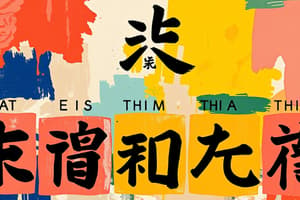Podcast
Questions and Answers
قارن بين الأيام التالية وأصول أسمائها: يوم الاثنين
قارن بين الأيام التالية وأصول أسمائها: يوم الاثنين
اليوم المقدس لآلهة القمر في اليونان القديمة = اليوم المسمى بناءً على آلهة الشمس أو القمر يُعتبر بداية التجارة بعد السبت اليهودي = مشتق من اسم إله الحرب في الأساطير النوردية ترجمته إلى 'يوم القمر' في اللاتينية = تطور اسمه من 'theia selene' كان يعرف باسم 'theia selene' في الإغريقية القديمة = كان يعرف باسم 'dies lunae' في اللاتينية
قارن بين الأيام التالية وأصول أسمائها: يوم الثلاثاء
قارن بين الأيام التالية وأصول أسمائها: يوم الثلاثاء
كان يعرف باسم 'dies Martis' في اللاتينية = كان يعرف باسم 'Tiwes dæg' في الإنجليزية القديمة اسم مستوحى من إله نورد تور = اشتق اسمه من إله روماني مرتبط بالصراعات العسكرية كان يُطلق عليه 'Tiwes dæg' في الإنجليزية القديمة = اسمه يشير إلى إله نورد من المعارك أو إله سماء كان يُطلق عليه 'dies Martis' في اللاتينية = اسمه تطور ليصبح 'Tuesday'
قارن بين الأيام التالية وأصول أسمائها: يوم الأربعاء
قارن بين الأيام التالية وأصول أسمائها: يوم الأربعاء
اسم يشير إلى إله المعركة والحروب = تُدعى على اسم إله جرماني روحاني كان يُطلق عليه 'dies Mercurii' في اللاتينية = كان يُطلق عليه 'Woden's day' في الإنجليزية تطور اسمه لـ 'Wednesday' = اسم مشتق من عدة آلهة مختلفة اسم يشير إلى إله روماني رسول = اسم مستوحى من إله جرماني لحكمة
قارن بين الأيام التالية وأصول أسمائها: يوم الخميس
قارن بين الأيام التالية وأصول أسمائها: يوم الخميس
قم بربط العناصر التالية بمكوناتها الأساسية في الحروف العربية: دائرات صغيرة تعرف بــ nukta
قم بربط العناصر التالية بمكوناتها الأساسية في الحروف العربية: دائرات صغيرة تعرف بــ nukta
قم بربط العناصر التالية بمكوناتها الأساسية في الحروف العربية: خطوط تعتبر نقاط مرجعية لتحديد موضع كل حرف
قم بربط العناصر التالية بمكوناتها الأساسية في الحروف العربية: خطوط تعتبر نقاط مرجعية لتحديد موضع كل حرف
قم بربط العناصر التالية بمكوناتها الأساسية في الحروف العربية: رمز يدل على نهاية الكلمة
قم بربط العناصر التالية بمكوناتها الأساسية في الحروف العربية: رمز يدل على نهاية الكلمة
قم بربط العناصر التالية بمكوناتها الأساسية في الحروف العربية: رموز تضاف بعد حرف لتمثيل صوت حرف متحرك قصير
قم بربط العناصر التالية بمكوناتها الأساسية في الحروف العربية: رموز تضاف بعد حرف لتمثيل صوت حرف متحرك قصير
قم بربط كل نمط خطي بوصفه الصحيح:
قم بربط كل نمط خطي بوصفه الصحيح:
قم بربط كل حروف التالية بأصلها التاريخي:
قم بربط كل حروف التالية بأصلها التاريخي:
قم بربط كل شكل خط مع استخدامه الأساسي:
قم بربط كل شكل خط مع استخدامه الأساسي:
قم بربط كل نمط خطي بالعصور التي ظهر فيها:
قم بربط كل نمط خطي بالعصور التي ظهر فيها:
اربط كل نوع خط بوصف استخدامه:
اربط كل نوع خط بوصف استخدامه:
Study Notes
Days of the Week: Exploring Their Origins and Meanings
The days we experience every seven days have intricate histories and connections beyond simply counting time. Let's delve into each day individually so you can better understand their origins and perhaps appreciate them more deeply.
Monday
Monday is named after the Moon goddess, Theia, in ancient Greece, where it was known as "theia selene," meaning bright moon or sun goddess. In Latin, dies lunae translates to "day of the moon." This day historically marked the beginning of commerce following the Jewish Sabbath, earning the nickname "moon-day" from merchants in Old English.
Tuesday
Tuesday derives its name from Tiwaz, the Norse god referencing war or sky father. Later, Teutonic tribes adopted this term, naming it "dies Martis" in Latin – Mars being the Roman deity associated with military conflict. It became "Tiwes dæg" in Old English, eventually morphing into our modern Tuesday.
Wednesday
Wednesday, like Tuesday, has roots in paganism. Woden, the Germanic warrior god of wisdom, gave rise to this day's moniker. The Romans called it dies Mercurii because they identified Mercury, their messenger god, with Wodin. Translating to "Mercury's Day" from Latin, it evolved in Middle English to become our current Wednesday.
Thursday
Thursday draws its inspiration from Thor, the Norse god of thunder and storms. Historically, early Germanic societies viewed this day as sacred to him. Consequently, the Saxons referred to it as Thorsdagr, while the Danes called it Punnradr. The Anglo-Saxons later renamed it "Þunresdæg," which transformed into Thursday.
Friday
Friday originated from Frigg, Odin's consort in Norse mythology. She personified love and fertility, making her appropriately linked to the fifth day of the cycle. Her associations were carried over by the Romans, who christened this day dies veneris, signifying Venus, their goddess of beauty and desire. Finally, this became Frīdag in Old High German before evolving into our contemporary Friday.
Studying That Suits You
Use AI to generate personalized quizzes and flashcards to suit your learning preferences.
Description
هذا الاختبار يقدم لك نظرة شاملة عن أصول ومعاني أيام الأسبوع، حيث تمتلك كل يوم تاريخًا معقدًا وروابط تاريخية تفوق مجرد قياس الزمن. تعرف على تاريخ كل يوم على حدة لتتفهم أصولها بشكل أفضل وربما تقدرها بشكل أعمق.




